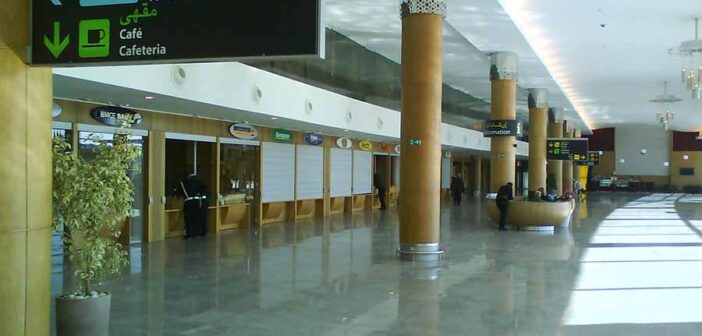Rabat–Salé Airport, located 8 kilometres east-northeast of Rabat’s city centre in Salé, serves as Morocco’s fifth-largest airport, handling over 1 million passengers annually. With flights to 34 destinations across 11 countries, operated by airlines like Ryanair, Air France, easyJet, and Royal Air Maroc, this modern hub offers a compact and efficient experience for travellers exploring Rabat’s cultural landmarks or connecting to cities like Paris, Madrid, and Istanbul.
Accessing the airport is convenient with several transport options. The Alsa City Bus AE connects the airport to Rabat Ville and Rabat Agdal train stations in about 30–40 minutes, costing €2.30 (25 MAD), with departures every hour from 7:00 AM to 8:00 PM.
Taxis outside the arrivals hall cost €14–€18 (150–200 MAD) for a 20-minute ride to central Rabat, with shared rides at €2.30–€3 per person depending on the time of day. Pre-booked transfers via services like AirportTransfer.com ensure fixed rates and English-speaking drivers. Drivers can use the N1 road, with short- and long-term parking available, including 30 vehicles at the taxi rank lot. A planned railway link by 2030 will further enhance connectivity.
The airport’s single terminal, modernised in 2012, spans 84,000 square metres with four jetways and 10 aircraft stands, accommodating planes like Boeing 737s and Airbus A320s. With 20 check-in desks and a streamlined layout, navigation is straightforward, aided by clear signage in English and Arabic. Passengers should arrive two hours early for domestic flights and three hours for international ones, as security and passport control can become crowded during peak seasons, particularly for non-Schengen flights. Terminal 2’s ongoing construction may cause temporary disruptions, with limited amenities in that area.
Dining and retail options are modest but sufficient. Three cafés in the terminal serve Moroccan dishes like tagine, pastries, and coffee, open from 6:00 AM to 10:00 PM. A duty-free shop offers local crafts, perfumes, and Moroccan sweets like chebakia, though Terminal 2 currently lacks retail due to construction. A small newsstand provides travel essentials, but prices can be high, with water at €2–€3. Travellers note the lack of 24-hour dining, so late-night passengers should plan ahead.
Facilities cater to essential needs with a focus on comfort. Free Wi-Fi is available in the Pearl Lounges, though public access is limited, and power outlets are scarce outside lounges. The Pearl Lounge in Terminal 1, open 24 hours, offers snacks, showers, and workspaces for €25–€35, accessible to all passengers. Families benefit from baby-changing rooms, while passengers with reduced mobility can access ramps, adapted toilets, and assistance via the MyWay service, bookable 48 hours in advance. Baggage storage is unavailable, with alternatives at Rabat Ville station. A currency exchange, ATMs, and a lost-and-found desk operate daily, and car rental agencies like Avis and Hertz are located in arrivals.
On-time performance is generally reliable, with real-time updates via Flightradar24, the airport’s website, or terminal screens. Handling around 147 weekly flights, the airport benefits from its smaller size, though peak periods can strain capacity. Airlines like Ryanair and Air Arabia Maroc maintain consistent schedules, but low-cost carriers may face cancellations during high demand.
Connections are efficient for single-ticket passengers, with minimum connection times of 60 minutes for Schengen and 90 minutes for non-Schengen flights. Baggage is typically transferred automatically, and the single terminal simplifies gate changes. Separate-ticket travellers should allow extra time for baggage reclaim and re-check-in, especially for non-Schengen routes requiring passport control. The Fast Track lane, available for €9, speeds up security during busy periods.
Potential delays often arise from security and immigration queues, particularly in Terminal 1, where non-EU passport checks can take up to 45 minutes with limited staffing. Construction on Terminal 2 may cause temporary gate shortages, leading to remote parking and bus transfers. Weather issues, like fog, can disrupt landings, as noted in past incidents, though modern navigation aids have reduced risks. Some travellers report unhelpful staff or language barriers, so using mobile boarding passes and pre-booking transfers can help.Rabat–Salé Airport delivers a practical and traveller-friendly experience. Its proximity to the city, clear layout, and essential amenities make it a solid choice for exploring Morocco’s capital or connecting to Europe and the Middle East.




